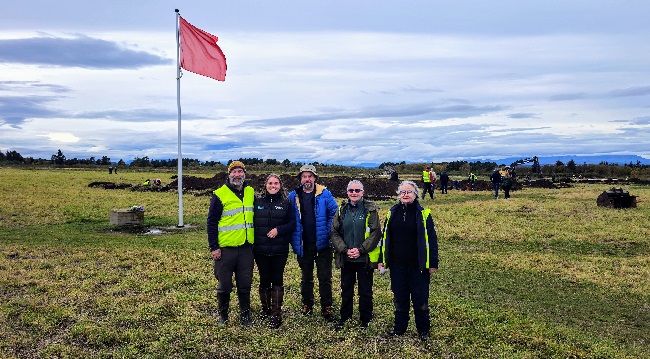Archaeological dig at Culloden Battlefield
Published: 17 October 2024
Archaeologists including UofG's Professor Tony Pollard and volunteers have begun a remarkable dig at Culloden Battlefield, where the course of British, European and world history changed dramatically nearly 280 years ago.
In a thrilling quest to uncover secrets from one of Scotland’s most significant historical sites, archaeologists and volunteers have begun a remarkable dig at Culloden Battlefield, where the course of British, European and world history changed dramatically nearly 280 years ago.
Experts armed with both traditional archaeology tools and cutting-edge technology are peeling back layers of earth to reveal untold stories of the final clash of the Jacobite Rising in 1746.
Led by the National Trust for Scotland’s Head of Archaeological Services, Derek Alexander, in collaboration with the Trust’s team at Culloden Battlefield and Professor of Conflict History and Archaeology at the University of Glasgow, Tony Pollard, this project aims to facilitate further understanding of the final battle of the Jacobite Rising of 1746.
Volunteers and archaeology experts from all over the world have joined the excavation, supporting the team in searching for new discoveries. The Trust is being supported by volunteers from RAF Lossiemouth and Kinloss Barracks, as well as archaeology students from as far away as North America and other parts of Europe.

Ellen Fogel Walker, Estates & Conservation Manager at Culloden Battlefield, said: “Working with our Archaeological team over the past four years has uncovered extensive knowledge of the battlefield and its role as a living landscape. Not only have we found material from the time of the battle, but prehistoric and modern material, which shows the continual presence of people here both before and after 1746.”
Derek Alexander, said: “It's always exciting to be working at Culloden Battlefield and so many of the artefacts have great stories to tell. Even small scale pieces of fieldwork can contribute to a better understanding of how the battle unfolded. We are really looking forward to working with Professor Pollard again and to making use of the techniques he has developed and honed at Waterloo.”
Lorne MacLeod, Visitor Services Assistant, Estates, at Culloden discovered the first artefacts of the dig on Monday. Lorne discovered what is believed to be a button, kicking the week off to a great start. Previous digs have uncovered a wide range of artefacts, including a shoe buckle believed to have belonged to Donald Cameron of Lochiel; grapeshot; and musket balls, each telling a piece of the story in this historic battlefield.
Professor Tony Pollard said: “It’s been nearly 20 years since I’ve worked on the archaeology of Culloden. We made some spectacular discoveries with metal detectors back them, and I’m delighted many of them are on display in the visitor centre.
“It’s exciting to be back, and I’m looking forward to us applying archaeological techniques we’ve developed more recently at Waterloo, where, as we did at Culloden first time around, we have made a valuable contribution to our understanding of a battle which in its own bloody way made history.”
This excavation combines traditional archaeological methods, such as grid-based test pits, metal detecting and modern techniques to uncover more artefacts that could provide further insights into the Battle of Culloden.
Areas such as the Field of the English will be targeted for metal detecting, utilising techniques applied during the excavation at the Battlefield of Waterloo, which maximised artefact recovery. Gary Craig will join the archaeologists on the project, who has led the detecting team for charity Waterloo Uncovered since its inception in 2015.
The dig will be conducted with great care, respecting the site’s solemn history. Culloden Battlefield is a designated war grave, and the Trust ensures all activities at this significant site are designed with thoughtful care and respect.
Culloden Archaeology Dig
The dig began on Monday 14 October, and will continue until Friday 18 October. Visitors get hands-on at the dig site on Friday 18 October, and free spaces can be booked on Eventbrite.
The Battle of Culloden
The course of British, European and world history was changed at Culloden on 16 April 1746. A ferocious war had come to Scotland, dividing families and setting clan against clan. It was here that the Jacobite army took their last stand to reclaim the thrones of Britain from the Hanoverians for a Stuart king. Learn more here: https://www.nts.org.uk/visit/places/culloden/the-battle-of-culloden
About the National Trust for Scotland
Established in 1931, the National Trust for Scotland is Scotland’s largest conservation charity and cares for, shares and speaks up for Scotland’s magnificent heritage. Over the last 90 years the Trust has pioneered public access to and shared ownership of some of the most magnificent buildings, collections and landscapes in Scotland. It cares for more than 100 sites, from ancient houses to battlefields, castles, mills, gardens, coastlines, islands, mountain ranges and the plants and animals which depend upon them. Learn more here - https://www.nts.org.uk/
First published: 17 October 2024

